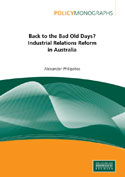
Since the Labor Government replaced WorkChoices with the Fair Work Act, many business leaders have complained that the new legislation has made the labour market inflexible and unworkable. Conversely, some union leaders have voiced their disappointment that the Fair Work Act did not go far enough in reversing the trend towards labour market liberalisation. So how far has Australia reformed its labour market, and in which direction has the Fair Work Act steered reform? Of the major changes of the reform era, the decentralisation of wage fixing has brought a wider use of workplace agreements which has facilitated the removal of several restrictive work practices. Changes to industrial action brought about a significant drop in the level of disputes across the economy. The modern Australian labour market is much more flexible today than during the pre-reform era. Unfortunately, on most indicators the Fair Work Act has reversed this trend. New bargaining laws guarantee unions a privileged place at the bargaining table and this is out of step with the prevalence of unions economy-wide. Also, unfair dismissal laws have broadened and predictably claims have increased. But more worrisome is the conciliation process creates pressure on employers to settle and pay ‘go-away money’ to avoid a costly court hearing.
Alexander Philipatos is a Policy Analyst with the Economics Program at The Centre for Independent Studies. He holds a bachelor of economics (with Honours) from La Trobe University.











